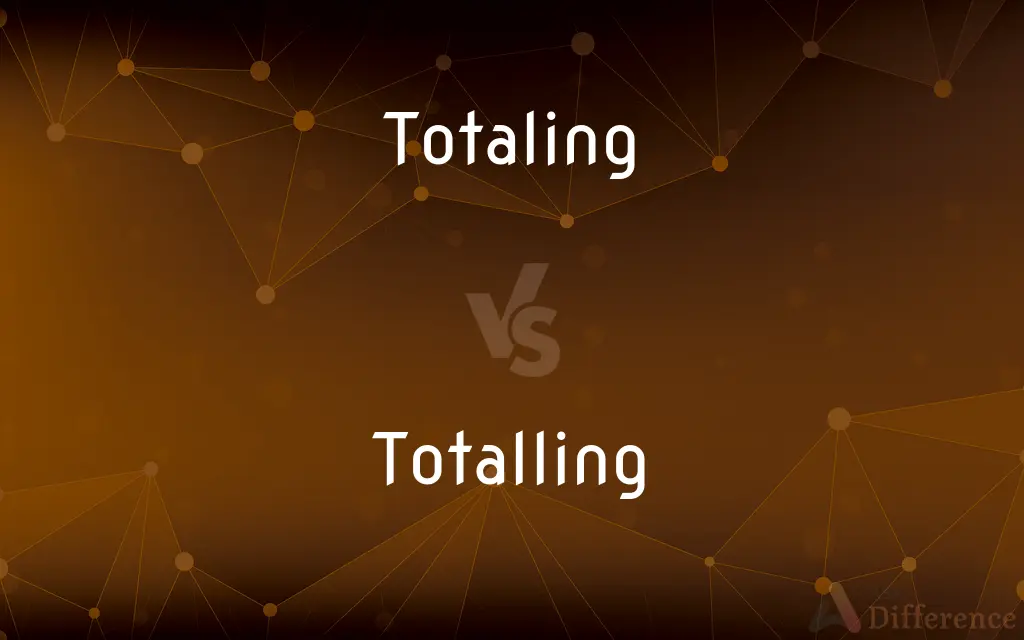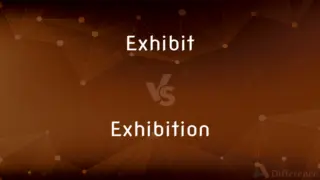Totaling vs. Totalling — What's the Difference?
By Tayyaba Rehman — Updated on October 28, 2023
Totaling and totalling are both correct; "totaling" is American English, while "totalling" is British English. Both mean adding up to a total.

Difference Between Totaling and Totalling
Table of Contents
ADVERTISEMENT
Key Differences
"Totaling" and "totalling" refer to the same action: the process of calculating the sum of various items or amounts. The difference lies in regional spelling preferences. "Totaling" is used in American English, which often simplifies spellings by omitting one 'l'. On the other hand, "totalling" is the preferred spelling in British English, which retains the double 'l' from the base verb "total."
When considering the grammar and usage of "totaling" and "totalling," both function identically. They are both present participles or gerunds of the verb "total." In a sentence, they can serve as an adjective or a noun, depending on the context. The spelling difference doesn't affect their grammatical role or meaning.
In educational contexts, it’s important to note these spelling variations between "totaling" and "totalling." American students and publications will typically use "totaling," while British educational materials will use "totalling." Both forms are correct within their respective varieties of English.
In international communication, awareness of these spelling variations is key. "Totaling" should be used when writing for an American audience or following American English guidelines. Conversely, "totalling" is appropriate for British audiences or when adhering to British English standards.
The choice between "totaling" and "totalling" should be consistent within a single document or piece of writing. Mixing American and British spellings can lead to inconsistency and may confuse readers. Writers should choose one form based on their target audience or style guide and stick with it throughout their work.
ADVERTISEMENT
Comparison Chart
Spelling Standard
American English
British English
Number of 'l's
One 'l'
Two 'l's
Common Use
US publications
UK publications
Pronunciation
Same
Same
Grammatical Function
Same (gerund/participle)
Same (gerund/participle)
Compare with Definitions
Totaling
Adding up: Calculating the sum.
The cashier is totaling the bill.
Totalling
Adding up: Calculating the sum.
The clerk is totalling the receipts.
Totaling
Constituting altogether: Forming a total amount.
The scores are totaling to 200.
Totalling
Accumulating: Gathering into a whole.
Debts are totalling rapidly.
Totaling
Accumulating: Gathering into a whole.
Expenses are totaling quickly.
Totalling
Constituting altogether: Forming a total amount.
The points are totalling to 150.
Totaling
Estimating a total: Calculating approximately.
He's totaling the expected costs.
Totalling
Resulting in: Leading to a total.
The repairs are totalling a high figure.
Totaling
Resulting in: Leading to a total.
The damages are totaling a large sum.
Totalling
Estimating a total: Calculating approximately.
She's totalling the potential expenses.
Totaling
An amount obtained by addition; a sum.
Totalling
"Totalling" is the preferred spelling in British English.
Totaling
The whole amount of something; the entirety
The storm damaged the total of the housing units.
Totaling
Of, relating to, or constituting the whole amount; entire
The total population of the city.
Totaling
Complete; utter; absolute
Total concentration.
A total effort.
A total fool.
Totaling
To determine the total of; add up
They totaled the applications at 600.
Totaling
To equal a total of; amount to
The week's receipts totaled more than $90,000.
Totaling
To wreck completely; demolish
The driver survived the crash but totaled the car.
Totaling
To add up; amount
It totals to $25.
Totaling
Present participle of total
Common Curiosities
Does the meaning change with the spelling?
No, both spellings have the same meaning.
Which English dictionaries include "totalling"?
British English dictionaries, like the Oxford English Dictionary.
Are totaling and totalling interchangeable?
Yes, but use "totaling" for American English and "totalling" for British English.
Is "totalling" acceptable in American publications?
Typically, "totaling" is used in American English.
Do both forms have the same pronunciation?
Yes, both are pronounced the same way.
Is "totaling" or "totalling" used as a noun?
Both can be used as gerunds (noun form) in sentences.
Can I use "totaling" in British English?
It's not standard; "totalling" is preferred in British English.
Can "totaling" and "totalling" be verbs?
Both are present participles of the verb "total."
Do "totaling" and "totalling" have synonyms?
Yes, synonyms include adding up, summing, calculating.
Why does American English prefer "totaling"?
American English often simplifies spellings by dropping extra letters.
Is it important to be consistent with these spellings?
Yes, consistency is important for clarity and style.
Is "totalling" often used in American academic writing?
No, "totaling" is commonly used in American academic writing.
How do spell-checkers handle these variations?
Spell-checkers may flag one or the other, depending on the language setting.
Are these spellings used in other English varieties?
Other English varieties may lean towards British or American spellings.
Can "totaling" be an adjective?
Yes, it can describe a process, e.g., "totaling process."
Share Your Discovery

Previous Comparison
Exhibit vs. Exhibition
Next Comparison
Uke vs. SemeAuthor Spotlight
Written by
Tayyaba RehmanTayyaba Rehman is a distinguished writer, currently serving as a primary contributor to askdifference.com. As a researcher in semantics and etymology, Tayyaba's passion for the complexity of languages and their distinctions has found a perfect home on the platform. Tayyaba delves into the intricacies of language, distinguishing between commonly confused words and phrases, thereby providing clarity for readers worldwide.
















































